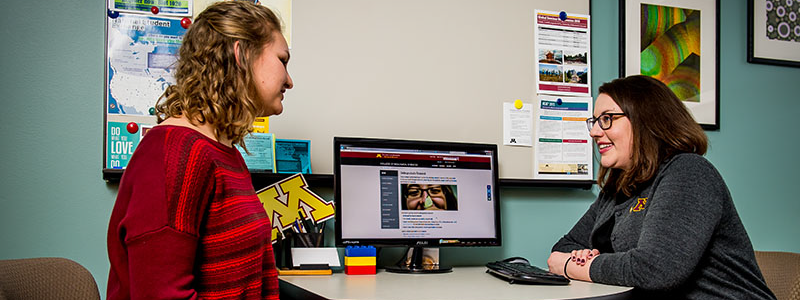Why You Should Talk to an Academic Advisor
There are many reasons to connect with your academic advisor. These may include, but are not limited to, the following:
- Exploring your major
- Choosing your courses for next semester
- Changes to your academic plan (for example, adding or dropping a major or minor)
- Your academic progress
- Long-term/graduation planning
- Planning for study abroad
- Community engagement and student activities
- Personal concerns, especially if they impact your academics
- Academic difficulty, probation, or suspension
- Returning to the university after more than a semester away
- Forms and petitions regarding your academic status or other types of certification (including OPT or CPT forms for international students)
When You Should See an Academic Advisor
Each college handles advising appointments differently. Some may require that you come in to be seen each semester to have a hold removed, while others may not have mandatory advising but still strongly encourage frequent contact with your advisor. It’s important to understand the requirements for your college.
Below are a few milestones, decision points, and conversation topics that you are likely to encounter during your undergraduate career.
Year 1:
- Fall and Spring course planning and registration
- Major and minor exploration
- Referrals to academic resources
- Engagement opportunities (student groups, learning abroad, volunteering)
Year 2:
- Fall and Spring course planning and registration
- Continued major and minor exploration and declaration
- Continued referrals to academic resources
- Continued engagement opportunities (student groups, learning abroad, volunteering)
- Referrals to internship and career planning resources
Year 3:
- Fall and Spring registration
- Major course planning
- Continued referrals to academic resources
- Continued engagement opportunities (student groups, learning abroad, volunteering)
- Referrals to internship, graduate school, and career planning resources
Year 4 and beyond:
- Fall and Spring registration
- Applying for graduation and degree completion steps
- Continued referrals to academic resources
- Continued engagement opportunities (student groups, learning abroad, volunteering)
- Referrals to graduate school and career planning resources
How to Prepare for an Advising Appointment
1. Schedule your appointment.
You'll want to do this early so that you can be prepared for your registration. Visit One Stop to find your registration time and plan an appointment with your advisor in advance of your registration queue time.
2. Review your Academic Progress Audit System (APAS) Report.
Review your degree progress and learn which requirements you have fulfilled and which requirements you still need to complete. You can view and print your APAS through your MyU account under “Academics” below your course schedule. Be sure to choose “open all sections” when reviewing your report.
Confused by what's on your APAS report? Check out this guide on how to read an APAS report.
3. Be prepared to discuss your goals for next year in class and outside of class.
Come prepared to share what is going well for you as well as any challenges you are encountering on campus.
4. Create a list of questions before your appointment.
If you have questions, bring them with you to your appointment. Consider all the aspects of your life, not just the academics, when you are creating your list of topics to discuss with your adviser. For example, sharing with your adviser about financial, housing, work, relationships or other issues is appropriate if they are interfering with your academic success.
5. Review registration and degree planning tools
Refresh yourself with registration tools you can use for things like remembering how to register for courses or planning future class schedules. The "You & Your Degree" tab at the top of the page can also help you think about topics you'd like to discuss with your advisor.
